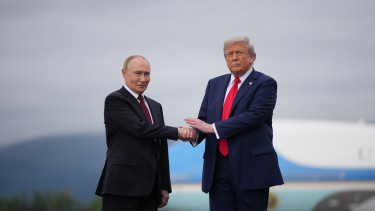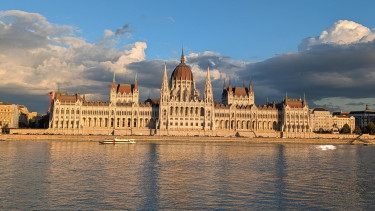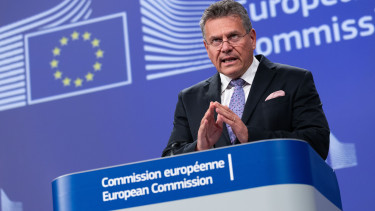Putin orders Russian nuclear deterrent forces put on alert

Key developments on the weekend:
- President Vladimir Putin ordered Russian nuclear deterrent forces put on alert on Sunday in response to what he called "aggressive statements" by leading NATO powers.
- The US responded that this was an “unacceptable” escalation.
- NATO chief Jens Stoltenberg said the announcement is "dangerous rhetroic," adding: "This is a behaviour which is irresponsible."
- Ukrainian and Russian delegations will meet on the border between Ukraine and Belarus for peace talks. Ukraine has agreed to peace talks with Russia “without preconditions”, the office of President Volodymyr Zelenskiy said.
- A package of tougher sanctions have been adopted against Vladimir Putin’s government and the regime of Belarusian president Alexander Lukashenko, which European Commission President Von der Leyen described as “complicit in this vicious attack against Ukraine”.
- This package includes blocking Russia's access to the SWIFT international banking payment system, shutting down the airspace for Russians, targeting the assets of Russian oligarchs, banning the transactions of Russia's central bank and freeze all its assets, and banning in the EU “the Kremlin's media machine”, including state-owned Russia Today and Sputnik.
- EU says expects millions of displaced Ukrainians.
Russia nuclear deterrent forces placed on alert
President Vladimir Putin ordered Russian nuclear deterrent forces put on alert Sunday in response to what he called "aggressive statements" by leading NATO powers, CNBC reported.
“Senior officials of the leading NATO countries also allow aggressive statements against our country, therefore I order the Minister of Defense and the Chief of the General Staff [of the Russian Armed Forces] to transfer the deterrence forces of the Russian army to a special mode of combat duty,” Putin said in the statement.
It is not immediately clear what the “special mode of combat duty” entailed. When launching the attack Putin has warned foreign countries not to interfere in his ongoing invasion of Ukraine.
To anyone who would consider interfering from outside: If you do, you will face consequences greater than any you have faced in history. All the relevant decisions have been taken. I hope you hear me,
said Putin.
The US responded that this was an “unacceptable” escalation, US ambassador to the United Nations Linda Thomas-Greenfield said on Sunday.
It means that President Putin is continuing to escalate this war in a manner that is totally unacceptable and we have to continue to stem his actions in the strongest possible way,
Thomas-Greenfield said in interview with CBS’ Face the Nation.
Russia and the United States typically have the land- and submarine-based segments of their strategic nuclear forces on alert and prepared for combat at all times, but nuclear-capable bombers and other aircraft are not.
If Putin is arming or otherwise raising the nuclear combat readiness of his bombers, or if he is ordering more ballistic missile submarines to sea, then the United States might feel compelled to respond in kind, according to Hans Kristensen, a nuclear analyst at the Federation of American Scientists. That would mark a worrisome escalation and a potential crisis, said Greenfield.
Speaking on ABC News on Sunday Jen Psaki, the White House press secretary, described Russia’s nuclear deterrence announcement as an example of Putin
manufacturing threats that don’t exist in order to justify further aggression.
Analysts told the Guardian that while the order itself was not immediately clear, it was not indicative of preparation for a first strike.
In response, Psaki said: “At no point has Russia been under threat from NATO, has Russia been under threat from Ukraine, this is all a pattern from President Putin. And we’re going to stand up for it. We have the ability to defend ourselves, but we also need to call out what we’re seeing here from President Putin.”
Putin's nuclear warning 'dangerous and irresponsible' - NATO chief
The secretary general of NATO has this afternoon responded to Vladimir Putin's decision to put Russia's nuclear forces on "special alert", Sky News reported.
Jens Stoltenberg said the announcement is "dangerous rhetroic," adding: "This is a behaviour which is irresponsible."
He told CNN: "And of course when you combine this rhetoric with what they are doing on the ground in Ukraine - waging war against an independent, sovereign nation, conducting full-fledged invasion of Ukraine - this adds to the seriousness of the situation."
Peace talks on Ukraine-Belarus border
Ukrainian and Russian delegations will meet on the border between Ukraine and Belarus for peace talks, Ukraine’s President Volodymyr Zelensky said on Sunday, four days after Russian troops invaded his country.
Zelensky said he had talked with Belarusian leader Alexander Lukashenko, a close Russian ally, who assured him that “all planes, helicopters and missiles stationed on Belarusian territory remain on the ground during the Ukrainian delegation’s travel, talks and return.”
Reuters is quoting Ukraine’s president Volodymyr Zelensky saying he will use every opportunity to secure peace, ahead of talks planned between Russian and Ukrainian representatives close to the Belarus border.
I do not really believe in the outcome of this meeting, but let them try so that later not a single citizen of Ukraine has any doubt that I, as President, tried to stop the war, when there was even a small, but still a chance,
said Zelensky.
As the negotiations on Ukraine-Belarus border take place, Iskander missiles were launched from somewhere near Mozyr, Belarus, said Anton Herashchenko, advisor to Ukraine’s Minister of Interior.
Iskanders have been launched against Ukraine from the Mozir area. Does that mean they have brought death somewhere... so is it a ceasefire?
As the negotiations on Ukraine-Belarus border take place, Iskander missiles were launched from somewhere near Mozyr, Belarus. Source: Anton Herashchenko, advisor to Ukraine’s minister of interior pic.twitter.com/3G2Yq1cdx8
— UkraineWorld (@ukraine_world) February 27, 2022
More sanctions on Russia AND Belarus
Under the new package of sanctions, the European Union will
- exclude Russian banks from the SWIFT system;
- ban the transactions of Russia's central bank and freeze all its assets, “to prevent it from financing Putin's war”
- target the assets of Russian oligarchs;
- shut down airspace for Russians. The EU is proposing a prohibition on all Russian-owned, Russian registered or Russian-controlled aircraft. These aircraft will no more be able to land in, take off or overfly the territory of the EU. This will apply to any plane owned, chartered or otherwise controlled by a Russian legal or natural person. “Our airspace will be closed to every Russian plane – and that includes the private jets of oligarchs,” commented European Commission President Ursula von der Leyen.
- in another unprecedented step, the EU will ban in its territory “the Kremlin's media machine”. “The state-owned Russia Today and Sputnik, as well as their subsidiaries will no longer be able to spread their lies to justify Putin's war and to saw division in our Union. So we are developing tools to ban their toxic and harmful disinformation in Europe,” said von der Leyen.
- target “the other aggression in this war – Lukashenko’s regime” that is “complicit in this vicious attack against Ukraine.” The new package of sanctions on Belarus include: (i) restrictive measures against their most important sectors, which will stop their exports of products from mineral fuels to tobacco, wood and timber, cement, iron and steel; (ii) the EU will also extend to Belarus the export restrictions we introduced on dual-use goods for Russia. (This will also avoid any risks of circumvention of our measures against Russia.) (iii) In addition, the EU will sanction those Belarusians helping the Russian war effort.
Moscow's exclusion from SWIFT, and other sanctions
Moscow’s exclusion from SWIFT, which stands for the Society for Worldwide Interbank Financial Telecommunication, means Russian banks will not be able to communicate securely with banks beyond its borders. Iran was removed from SWIFT in 2014 following developments to Tehran’s nuclear programme, CNBC reported.
SWIFT is an independent enterprise based in Belgium that serves as an internal messaging system between more than 11,000 banks and financial institutions in over 200 countries and territories.
After the announcement, Ukrainian Prime Minister Denys Shmyhal welcomed the measure, writing in a tweet, “Appreciate your support and real help in this dark time. Ukrainian people will never forget this! Keep holding the line! We are on our land.”
Removing Russian from SWIFT was announced on Saturday.
"We, the leaders of the European Commission, France, Germany, Italy, the United Kingdom, Canada, and the United States condemn Putin's war of choice and attacks on the sovereign nation and people of Ukraine. We stand with the Ukrainian government and the Ukrainian people in their heroic efforts to resist Russia's invasion."
Russia's war represents an assault on fundamental international rules and norms that have prevailed since the Second World War, which we are committed to defending. We will hold Russia to account and collectively ensure that this war is a strategic failure for Putin,
they said in a joint statement.
The aforementioned parties have committed to undertake the following measures:
- They commit to ensuring that selected Russian banks are removed from the SWIFT messaging system. This will ensure that these banks are disconnected from the international financial system and harm their ability to operate globally.
- They commit to imposing restrictive measures that will prevent the Russian Central Bank from deploying its international reserves in ways that undermine the impact of our sanctions.
- They commit to acting against the people and entities who facilitate the war in Ukraine and the harmful activities of the Russian government. "Specifically, we commit to taking measures to limit the sale of citizenship—so called golden passports—that let wealthy Russians connected to the Russian government become citizens of our countries and gain access to our financial systems."
- They commit to launching this coming week a transatlantic task force that will "ensure the effective implementation of our financial sanctions by identifying and freezing the assets of sanctioned individuals and companies that exist within our jurisdictions. As a part of this effort we are committed to employing sanctions and other financial and enforcement measures on additional Russian officials and elites close to the Russian government, as well as their families, and their enablers to identify and freeze the assets they hold in our jurisdictions. We will also engage other governments and work to detect and disrupt the movement of ill-gotten gains, and to deny these individuals the ability to hide their assets in jurisdictions across the world."
- Finally, they will step up their coordination against disinformation and other forms of hybrid warfare.
EU says expects millions of displaced Ukrainians
The EU's executive said on Sunday that Europe was facing its biggest humanitarian crisis in many years following Russia's invasion of Ukraine, and the number of Ukrainians internally displaced by the strife could be more than seven million.
We are witnessing what could become the largest humanitarian crisis on our European continent in many, many years. The needs are growing as we speak,
Reuters cited Janez Lenarcic, European Commissioner for Humanitarian Aid and Crisis Management, as saying.
"So for the humanitarian situation overall, the currently expected number of displaced Ukrainians is over 7 million," he told a news conference in Brussels after a special meeting of EU member states' interior ministers to discuss the crisis.
Citing United Nations estimates, he said
around 18 million Ukrainians will be affected by the conflict in humanitarian terms in the country or neighbouring countries, 7 million internally displaced and 4 million who flee the country as refugees.
"Even though these are very rough estimates, the figures are huge, and we have to prepare for this kind of emergency, which is of historical proportions," Lenarcic added.
The UN refugee agency has said more than 368,000 people have fled Ukraine into neighbouring countries, the UN said earlier today.
Cover photo: Shutterstock








